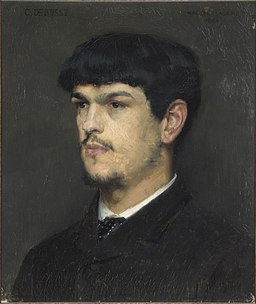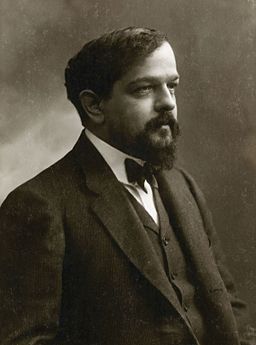
Debussy’s music was noted for its frequent use of non-traditional scales and chromaticism. The Symbolism movement, popular in France at the time, inspired his composing and his cultural participation.
He began piano lessons at the age of 7 and at 10 he entered the Paris Conservatoire, where he was a student for 11 years. He was an extraordinary pianist and could have had a professional career as such. He performed much of the literature of Beethoven, Schumann, Weber, and Chopin.
During the summers of 1880, 1881, and 1882, Debussy traveled with Tchaikovsky’s patroness, Nadezhda von Meck. In 1880, she sent Debussy’s Danse bohémienne to Tchaikovsky. “It is a very pretty piece, but it is much too short,” he wrote. “Not a single idea is expressed fully, the form is terribly shriveled, and it lacks unity,” said Tchaikovsky. The manuscript remained in the von Meck family and was eventually sold to B. Schott’s Sohne in Mainz and published in 1932.
A few of Debussy’s early works on IPA Source
Fleur des blés (1880)
IPA Text: https://www.ipasource.com/catalog/product/view/id/5991/category/364
Rêverie (1880)
IPA Text: https://www.ipasource.com/catalog/product/view/id/5987/category/364
Fantoches (1882)
IPA Text: https://www.ipasource.com/catalog/product/view/id/5956/category/364
Mandoline (1882)
IPA Text: https://www.ipasource.com/catalog/product/view/id/11917/category/364
Chanson espagnole (1883)
IPA Text: https://www.ipasource.com/catalog/product/view/id/11926/category/364
Debussy won the Prix de Rome for composition with his piece L’enfant prodigue. His award was a scholarship to the Académie des Beaux-Arts in the Villa Medici where he completed a four-year residence beginning in 1885. He was unhappy at the academy and often was unable to compose. One collection of art songs on IPA Source from this time period is Ariettes oubliées:

A few more of Debussy’s compositions on IPA Source
Cinq poèmes de Charles Baudelaire (1887–1889)
Listen to Barbara Hendricks, soprano; Michel Béroff, piano: https://youtu.be/UxciBOjcWsQ
Proses Lyriques (1892-1893)
Le promenoir des deux amants (1904-1910)
Debussy had a number of affairs, including one with Emma Bardac while he was married to Rosalie Texier. The situation was so controversial and they experienced so much rancor that Debussy and Bardac fled France for England. Bardac and Debussy had one daughter, Claude-Emma.
Partly due to his failing health, Debussy left several operatic projects unfinished, including two based on stories by Edgar Allan Poe: The Devil in the Belfry and The Fall of the House of Usher. He was also considering an opera based on Shakespeare’s As You Like It.
Debussy was made Chevalier of the Legion of Honour in 1903. Debussy died of cancer on March 25, 1918.
View our entire collection of Claude Debussy texts: https://www.ipasource.com/composer/d/debussy-claude-1862-1918.html

2 thoughts on “Featured composer: Claude Debussy”
Comments are closed.